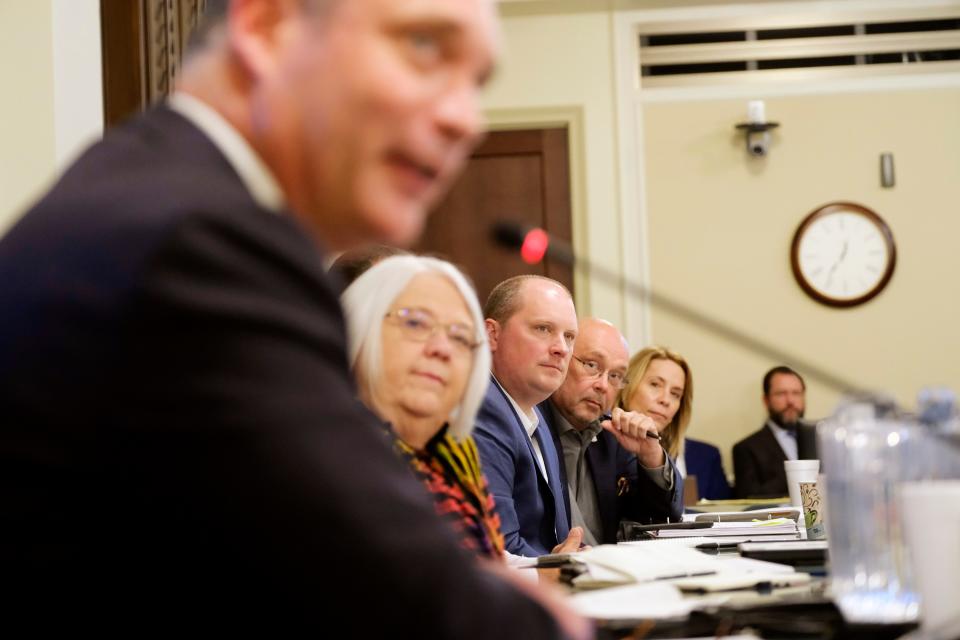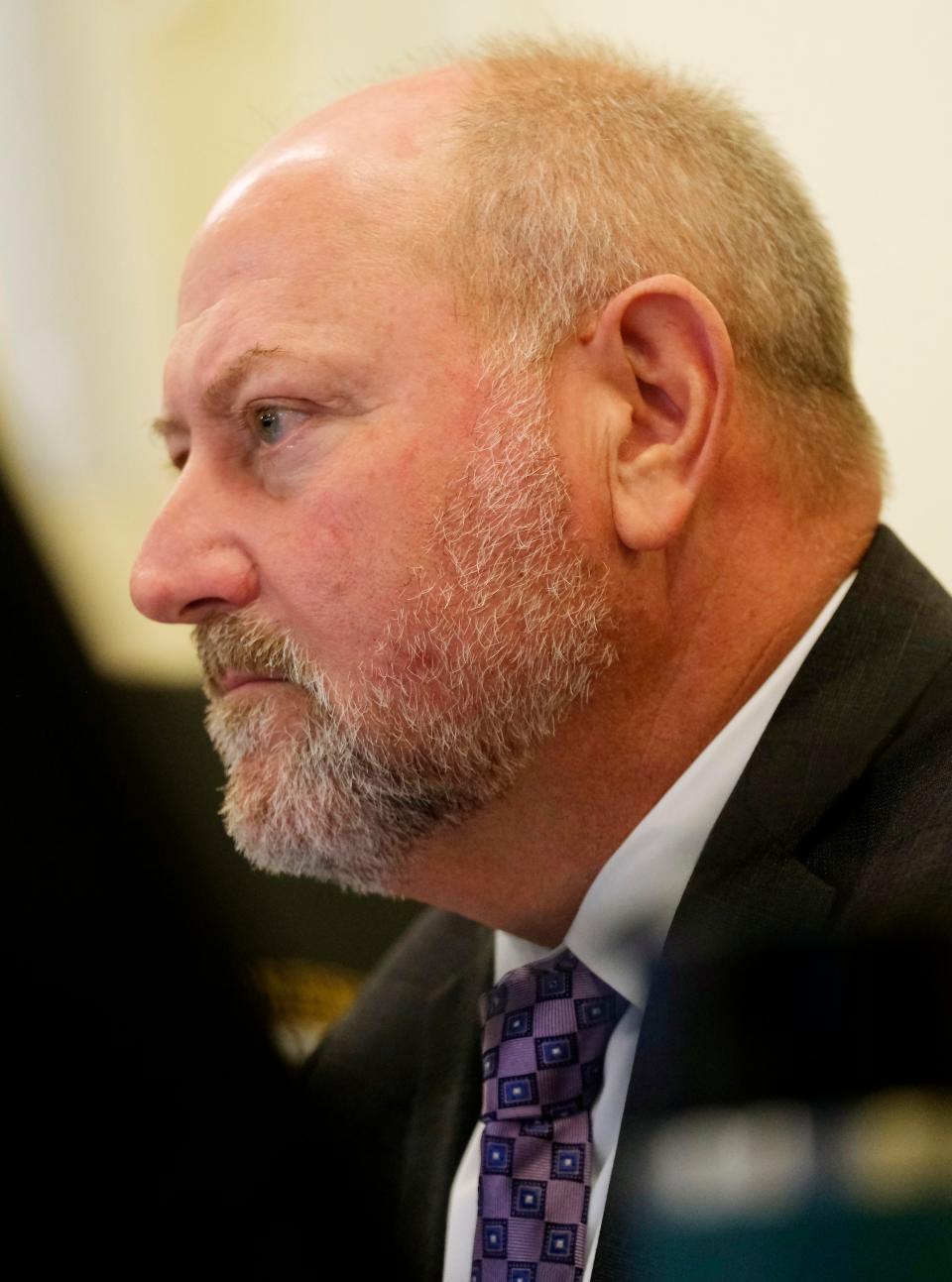With $60M in flux, Oklahoma House says 'permanent solution' vital for tribal compacts
- Oops!Something went wrong.Please try again later.
- Oops!Something went wrong.Please try again later.
Oklahoma lawmakers will need to focus on key compacts between the state and tribal nations when they reconvene in the spring, House Speaker Charles McCall said Wednesday.
The Legislature voted in July to renew tobacco tax and vehicle registration compacts with tribal nations through 2024. But the deals, which generate about $60 million a year for the state, remain in flux past that date.
“We’ll have to find a permanent solution going forward,” said McCall, R-Atoka.
The House leader’s remarks followed a two-day legislative study on state-tribal compacts which concluded Wednesday at the state Capitol. McCall called for the hearings earlier this year, when controversy over the tobacco tax and vehicle registration compacts first surfaced.
Gov. Kevin Stitt has been the top critic. He pressed lawmakers not to renew the deals without his approval and then sued McCall and Senate President Pro Tem Greg Treat after legislators voted to extend the compacts anyway.

McCall said he would continue talking with tribal officials, Senate leaders and Stitt to try to build consensus around longer-term deals. But he acknowledged all sides aren’t talking yet.
“I think what comes out of this interim study, one of the common themes, is just we need a higher level of communication and a higher level of personal communication among the heads of state and the tribal nations,” McCall said. “So we need to keep taking steps in that direction.”
House Speaker Charles McCall disputes Gov. Kevin Stitt on who has authority to negotiate tribal compacts
The hearings went into the legal background and history of state-tribal compacts. McCall invited testimony from state legal experts and leaders of the Cherokee, Chickasaw, Choctaw and Muscogee nations.
Brad Wolgamott, the top researcher for the House, said hundreds of compacts exist between the state and tribes. More than 400 of the agreements allow tribal and state law enforcement agencies to enforce one another’s laws, an issue that became especially pertinent after the McGirt v. Oklahoma ruling.
More: Do tribal citizens owe state taxes after McGirt? Oklahoma Supreme Court will hear case
No one from Stitt’s office testified.
McCall said the hearings made clear the state cannot enforce its laws on tribal nations and should prioritize compacts as a way to work through disputes. McCall, who is term limited after next year, ended the study by calling on fellow lawmakers to continue to assert the Legislature’s “ultimate authority” on compacts. The governor has contended his office should negotiate the deals.
Mark Harter, chief counsel for the House, explained the federal and state laws that give Oklahoma the power to compact with tribal nations. The first compacts stemmed from a 1991 U.S. Supreme Court ruling that found Oklahoma could not impose state taxes on cigarettes sold by the Citizen Potawatomi Nation.
More: Governor announces a plan for sports betting in Oklahoma, but many hurdles lie ahead
“If you want to envision it this way, if (the Tax Commission) were to knock on the front door of the tribal offices and request permission to financial information related to these transactions, if the answer is no, that has to be the end of that discussion,” Harter said.
The court suggested the tax dispute could be settled through compacts, and lawmakers passed a law to allow the state to enter into such agreements. The deals have been renegotiated since then. Under their current terms, the state and tribal nations split tax revenue from tobacco products sold on tribal lands.
“Compacting solutions to conflicts, if possible, is always preferable to launching litigation,” said Lindsay Robertson, who teaches Native American law at the University of Oklahoma law school.
“It’s faster, safer, cheaper and doesn’t poison relations between parties.”

Lawmakers question the impact of the McGirt ruling
Many of the questions lawmakers asked during the hearing — which were read aloud anonymously by Rep. Kevin Wallace — focused on the impacts of the McGirt decision. In that 2020 case, the Supreme Court ruled the Muscogee Nation’s reservation still existed in eastern Oklahoma. The ruling has since been applied to several other reservations.
Stitt has worried the state could lose its ability to tax tribal citizens on those lands. He called lawmakers back into a special session this fall and asked them to pass a “trigger law” to eliminate the state income tax if a court ruled tribal citizens were exempt. Lawmakers ultimately didn’t act on his request, but a legislator asked about it during the compact hearing.
More: Oklahoma's largest tribes call for negotiation to settle differences on new tax agreements
Harter pointed out the McGirt ruling stemmed from a criminal case, meaning questions about civil authority on those lands are far from settled.
“It will take another case or controversy, generally speaking, to reach the U.S. Supreme Court in order to resolve some of the questions that you’ve been hearing over the course of committee’s work,” he said.
Robertson said he believed it would be unprecedented for reservations to exist under criminal law but not civil law.
“I think that if the court were to find that (the) Muscogee (reservation) was Indian Country for one purpose but not another, it would be the first time in history that that sort of line had been drawn,” he said.
Molly Young covers Indigenous affairs. Reach her at mollyyoung@gannett.com or 405-347-3534.
This article originally appeared on Oklahoman: Oklahoma House pursuing 'permanent solution' for tribal compacts

